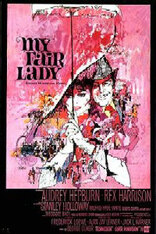|
One of the dozens of things I keep track of in feature films is the language used by and in reference to female characters, both women and girls. My Fair Lady (1964), a musical based on George Bernard Shaw’s play, Pygmalion, boasts few named female characters that appear in more than one scene (Audrey Hepburn, Gladys Cooper, Mona Washbourne and Isobel Elsom), however, they all have assertive moments, Hepburn in particular. It won the Oscar, BAFTA and Golden Globe awards for best picture, as well as several other awards. The most enjoyable thing about My Fair Lady, for me, is the uncommonly assertive language used by the lead female, named Eliza Doolittle (Hepburn), a street vendor who accepts to live with a phonetics professor (Rex Harrison as Henry Higgins) for a wager he makes that he can pass her off as a member of the British upper class in six months’ time. He is a brute with her, and she repeatedly stands up to him. For example, she says to him, “I have a right to be here if I like, same as you,” “You’re no gentleman!”, “You don’t care for nothin’ but yourself!”, “You’re a great bully, you are!”, “I won’t stay if I don’t like, and I won’t let nobody wallop me!”, “Because I want to smash your face! I could kill you, you selfish brute!”, “Don’t you hit me!” and “Do you want me back only to pick up your slippers and put up with your tempers and fetch and carry for you?” She also sings to him, “I shall not feel alone without you. I can stand on my own without you” and tells him, “I can’t talk to you. You always turn everything against me. I’m always in the wrong. But don’t be too sure that you have me under your feet to be trampled on and talked down.” Also, she says of him: “he’s no gentleman,” “[…] he treats me as if I was dirt,” “Don’t let him speak to me like that” and “I should never have known how ladies and gentlemen behave if it hadn’t been for colonel Pickering. He always showed me that he felt and thought about me as if I was something better than a common flower girl.” Talk about progressive speech! Cinema has rarely given female moviegoers a woman who stands up to her oppressor the way Eliza does. It's a shame that the ending, a very short scene, has Eliza returning to Higgins. It conveys the regressive message that, at the end of the day, it is acceptable for men to treat women badly. Hepburn's assertive speeches aren't the only ones. Mona Washbourne, too, is assertive. For instance, she says to Harrison, her employer, “You can’t walk over everybody like this” and “Oh, do be sensible, sir.” And Gladys Cooper is more assertive than many 21st century female characters. When told of her son’s behaviour she says, “This is simply appalling. I should not have thrown my slippers at him; I should have thrown the fire iron.” She also values Hepburn and says of her to Harrison, “Eliza came to see me this morning, and I was delighted to have her. And if you don’t promise to behave yourself I must ask you to leave.” Rarely has cinema given us women who stand up for other women like this. Also, when Hepburn leaves him Cooper says to herself, “Bravo, Eliza!” This type of assertive speech from female characters is something female viewers are still not getting enough of, over fifty years later. I look forward to sharing my findings about the language used in mainstream movies of the 20th and 21st centuries in my upcoming film guide for women. © 2019 Alline Cormier
1 Comment
|
Categories |


 RSS Feed
RSS Feed